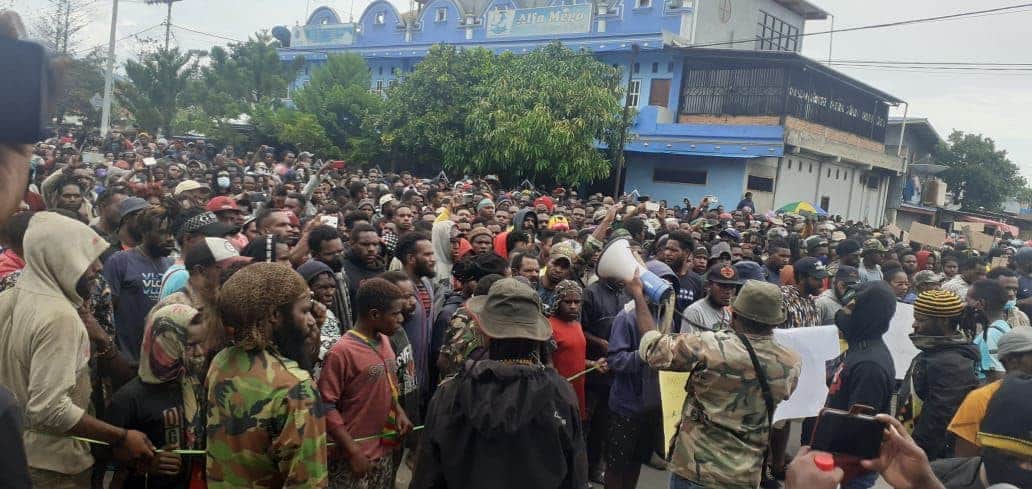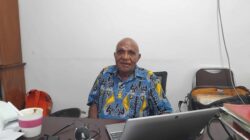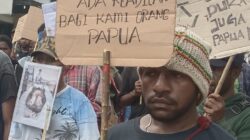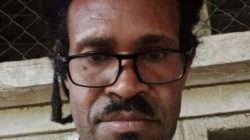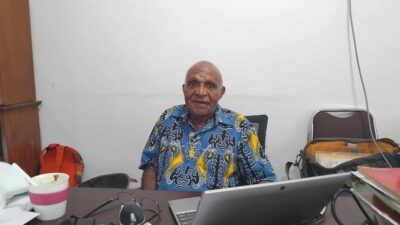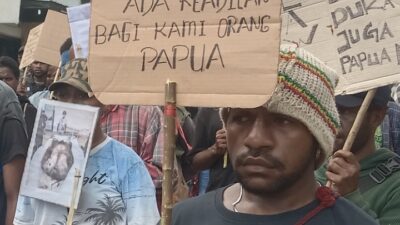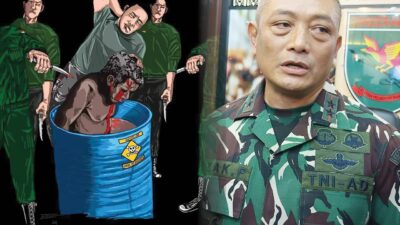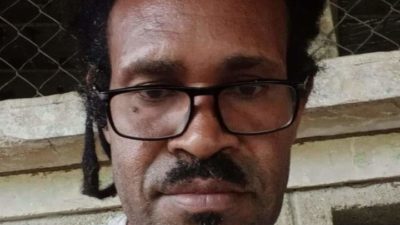Jayapura, Jubi – Papuan People’s Petition spokesman Jefry Wenda said his party called on the Papuan people to take part in a peaceful protest to be held on April 1, 2022, to urge the government to revoke the new Special Autonomy (Otsus) Law for Papua, cancel the planned expansion of Papua and West Papua provinces, and grant the right to self-determination for the Papuan people.
“We call on the 116 grassroots organizations, student youth, tribal heads, and Papuan people who are members of the Papuan People’s Petition, as well as 718,179 people who have signed our petition to consolidate and mobilize in their respective regions for a national protest on April 1,” Wenda told Jubi on Monday, March 28, 2022.
Wenda said that the Papuan People’s Petition also expected support from non-Papuans who lived in Papua. “We appeal to our non-Papuan brothers and sisters— the Javanese, Madurese, Batak, Toraja, Bugis, East Nusa Tenggara, etc—who have long lived in Papua and considered themselves part of the Papuan nation to be involved in the national protest,” he said.
In addition, Wenda hoped that the Papuan Church Council (DGP), Papuan Customary Council (DAP), and various non-governmental organizations could also participate in the protest.
Wenda said that there were a number of things that prompted the Papuan People’s Petition to plan the action. One of them is the government’s move to gather a number of regents whose territories will be merged into the Central Mountains Province. According to him, the Ministry of Home Affairs had invited the nine regents through a letter dated March 4, 2022.
“The meeting was planned to take place on March 14, 2022, to discuss preparation for the Papua expansion based on Article 76 Paragraph (3) of Law No. 2/2021 on the Second Amendment to Law No. 21/2001 on Papua Special Autonomy,” said Wenda.
He said his party had also monitored the steps taken by a number of local political elites in Papua and West Papua, including the West Papua Governor Decree No. 125/72/3/2020 on the establishment of the Southwest Papua Province.
“There was also another declaration of expansion from the four regents [of Merauke, Asmat, Boven Digoel, and Mappi]. Then there was a request for the expansion of Papua Province from Papuan Central Highlands Association chair Befa Jigibalom to President Joko Widodo,” Wenda added.
The Papuan people had responded to the political elite’s move by taking to the streets against the expansion of Papua, which took place in many places including Jakarta, Yogyakarta, Jayapura, Wamena, Enarotali, and Dekai. The protest in Dekai, the capital of Yahukimo Regency, ended in clashes in which two protesters were allegedly shot and killed by the police.
“Papuans realize that efforts to establish the Province of Central Papua and [other new provinces] have been planned long before the enactment of the new Otsus Law. Therefore, the Papuan people reject Otsus Law because it only caters to the elite’s interest to suppress the Papuan people’s movement demanding independence,” said Wenda.
Wenda assessed that the central government had unilaterally changed the substance of the previous Otsus Law, including by changing the rules for the division of provinces in Papua. In fact, such division and expansion are considered to only increasingly marginalize the Papuan people.
“As a result of the expansion, there has been a lot of polarization. The Papuan people are very far from being prosperous. The Papuan people’s health is poor while its illiteracy rate is the highest in Indonesia, despite the land is a gold and oil and gas producing region. Mimika Regency is one of the poorest cities in Papua when, ironically, mining giant PT Freeport Indonesia is there,” he said.
According to Wenda, regional expansion did not necessarily create job opportunities for Indigenous Papuans. He also criticized the formation of New Autonomous Regions (DOB) that are always used as an excuse for the Indonesian Military (TNI) and Police to build new security posts in Papua.
“The Indonesian government has used a militaristic approach in Papua up until now. From 1962 to 2004, at least 500,000 Papuan people died in a series of large-scale military operations. In the last four years alone, military operations have taken place in Nduga, Puncak Jaya, Intan Jaya, Yahukimo, Bintang Mountains, as well as in Maybrat, West Papua Province,” he said.
Wenda said the military operation had caused displacement and violations of human rights, prompted civilians to live in fear and terror, and lose their homes and property. Displace people also lose access to education and health.
He emphasized that the expansion or formation of new autonomous regions in Papua would only benefit investors. He said that the construction of roads, ports, urban infrastructure, and other vital assets would only be used by investors to exploit Papua’s natural wealth.
Lecturer of the Government Science Department of Faculty of Social and Political Sciences, Cenderawasih University, Yakobus Murafer, reminded the Indonesian Government and the Papua Provincial Government to be communicative in addressing the regional expansion issue.
Murafer emphasized that the governments must listen to the protesters because expressing their aspirations is part of democracy. Murafer said the government should indeed learn from the results of previous regional expansions, which showed that not all divisions had a positive impact. “The development process has not been fully carried out, and it becomes the burden of the central government,” he said. (*)


